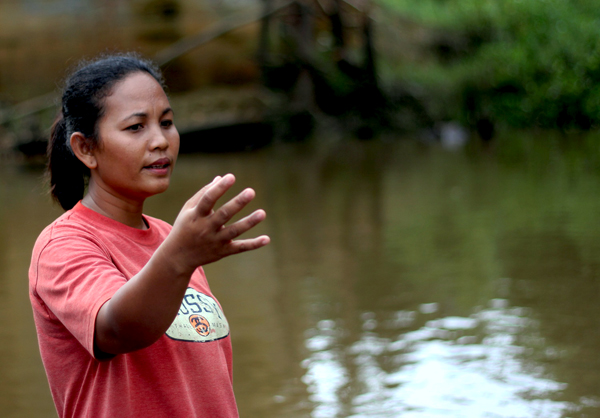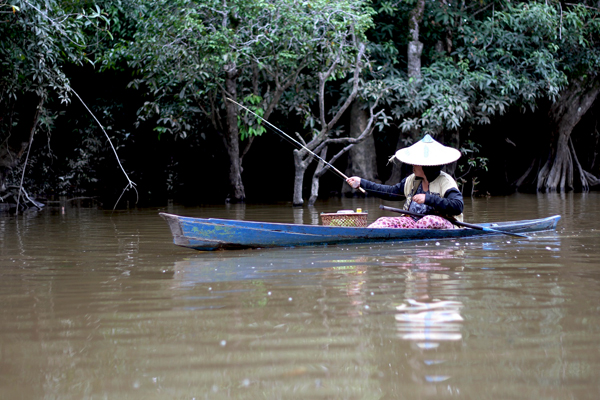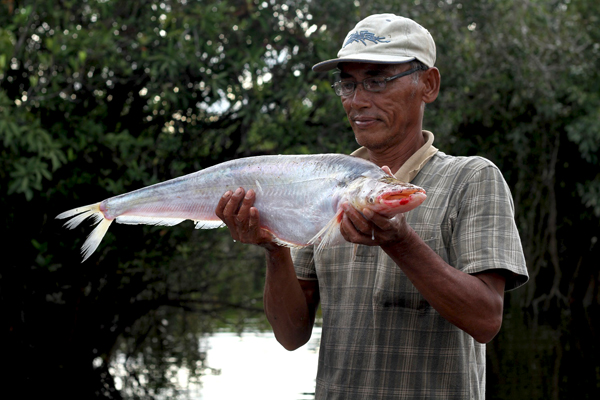
8 July 2015, Andi Fachrizal, Sanggau, West Kalimantan
The sun began to set in the west when Anita came down from her residence in Pedalaman Village, Tayan Hilir District, Sanggau Regency, West Kalimantan. The speedboat she was riding sped along the Putat River to the Bekat Lake.
The journey of about 20 minutes on the small river becomes imperceptible because of the familiarity of this area by the 27-year-old woman. Her voice broke as she explained a number of problems faced by fishermen in the Pedalaman Village.
Meanwhile, villages on the riverbanks, as if presenting a distinctive panorama, are like a country on water. It can also be seen how residents make use of existing natural resources by cultivating a variety of local fish such as toman in karamba.
Anita is the Chief of Fisherwomen of Sungai Putat. Local women fishermen have trusted her since 2010. Now, Anita and hundreds of other fishermen are fighting as they want to save Lake Bekat from the threat of environmental degradation.
Since extractive industries such as mining and oil palm plantations have planted themselves in Tayan Hilir, the environmental carrying capacity of Lake Bekat has started to decline. The indicator is the fishermen’s catch.
“Before the company existed, the income of fishermen in Lake Bekat was sufficient to support the family economy. We just need to find fish in the lake. You don’t need to bother looking for additional income,” said the mother of two when she was visited by the interviewer in the Pedalaman Village, some time ago.

It has become a tradition, said Anita, fishermen will go down to the lake at 24.00 WIB and return around 07.00 am. With a fishing period of seven hours, fishermen can carry three baskets of fish. Each basket contains 10 kilograms of fish.
“But that’s the story first, before there were companies operating around the lake. Now, you get one basket. Going to the lake at 23.00 WIB, returning home in the morning only got three kilograms,” she said quietly.
She suspects that the decline in fisherman’s catch has recently been triggered by extractive company waste. The waste flows into the Putat River and into the Bekat Lake.
Based on records, PT. Sanmas Mekar Abadi (SMA) entered the Rural Village in 2010. One of the groups of PT. Mahkota Karya Utama (MKU) which operates in Sejotang Village is engaged in the bauxite mining sector.
“In 2013, this company started building bridge infrastructure. After just a year, the bridge built on the Putat River almost collapsed. The conditions are very disturbing for fishermen who want to make a living on the lake, ”said Anita.
Local fishermen have asked the company to repair the bridge though they weren’t heard. Even after the company stopped operating due to the smelterization policy, the bridge was not repaired. In fact, the condition is getting worse and can threaten the safety of fishermen.
In fact, the Putat River is the only access for the fishing communities of the Village of Interior to enter Bekat Lake to catch fish. “There is no other way to the lake except through the Putat River. Now, our path is interrupted by a sloping bridge. The lake has also been polluted,” she said.
The threat of waste does not only come from bauxite mining. Around Lake Bekat, palm oil has also been planted. “This means that the threat of waste is getting bigger. Before this lake runs out, we ask the government to turn Lake Bekat into a protected lake, “pleaded Anita.

Source: http://www.mongabay.co.id/2015/07/08/srikandi-pengawal-danau-bekat-ini-keluhkan-limbah-tambang/